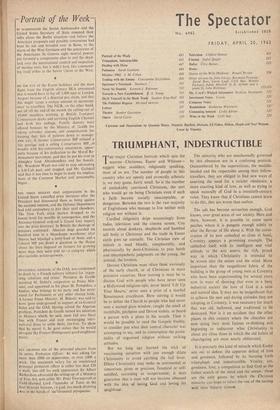TRIUMPHANT, INDESTRUCTIBLE T HE - major Christian festivals which spin the seasons—Christmas, Easter
and Whitsun- suggest what muddlers, religiously speaking, most of us are. The number of people in this country who are openly and avowedly atheistic is, we may guess, fairly small. So is the number of unshakably convinced Christians, the sort who would go on being Christians even if such a faith became socially unacceptable, or dangerous. Between the two is the vast majority of Englishmen who manage to live neither with religion nor without it.
Curdled religiosity drips nauseatingly from radio, television and the cinema screen. Coy records about donkeys, shepherds and bambini sell hotly at Christmas and the trade in Easter cards goes up annually. The Christian view of morals is used blindly, complacently, and pharisaically by demi-Christians to pass harsh and unsynipathetic judgments on the young, the sensual, the loveless.
Devout Christians must often think enviously of the early church, or of Christians in more primitive countries. How moving it must be to discuss God with people who have never seen a Hollywood religious epic, never heard 'Lift Up Your Hearts,' never seen a print 'of a morbid Renaissance crucifixion. How stirring it would be to define the Church to people who had never seen a stained glass window, caught the smell of mothballs, pitchpine and Devon violets, or heard a parson with a plum in 'his mouth. Then it would be possible to read the Gospels freshly, to consider just what their central character was attempting to say, and to contemplate the poten- tiality of organised religion without striking attitudes.
But we long ago learned the trick of vaccinating ourselves with just enough dilute Christianity to avoid catching the full fever. Dilute Christianity may make us sentimental or censorious, pious or precious, fanatical or self- satisfied, according to temperament; it does guarantee that a man will not become obsessed with the idea of loving God and loving his neighbour. The minority who are unashamedly governed by this obsession are in a confusing position. Outnumbered by the superstitious, the muddle- headed and the respectable among their fellow- travellers, they are obliged to find new ways of asserting the need for a stricter obedience, a more exacting kind of love, as well as trying to speak naturally of God in a twentieth-century voice. They know that if Christians cannot learn to do this, they are worse than useless.
The salt has become savourless enough, God knows, over great areas of our society. Here and there, however, it is possible to come upon patches. where it is pungent enough subtly to alter the flavour of life about it. With the conse- cration of its new cathedral so close at hand, Coventry • appears a promising example. The cathedral itself with its intelligent and vital attitude to the arts asserts the rich, proud way in which Christianity is intended to be woven into the senses and the mind. More important than the magnificent fabric of the building is the group of young men at Coventry who have been experimenting for several years now in ways of showing that even in a busy industrial society the love of God is a sane and natural idea. It may not be insignificant that to achieve the new and daring attitudes they are adopting in Coventry, it was necessary for much that was old, hallowed, and traditional to be destroyed. Nor is it an accident that the other places in this country where the churches are now doing their most furious re-thinking and beginning to rediscover what Christianity is about are often those in which the old habits of churchgoing are most nearly obliterated.
It is precisely this kind of miracle which Easter sets out to define; the apparent defeat of love and goodness, followed by its bursting forth triumphant and indestructible. Vitality, joy, goodness, love, a compulsion to find God at the fullest stretch of the mind and the senses: these are the only germs by which the Christian minority can hope to infect the rest of the society with their bizarre disease.


































 Previous page
Previous page